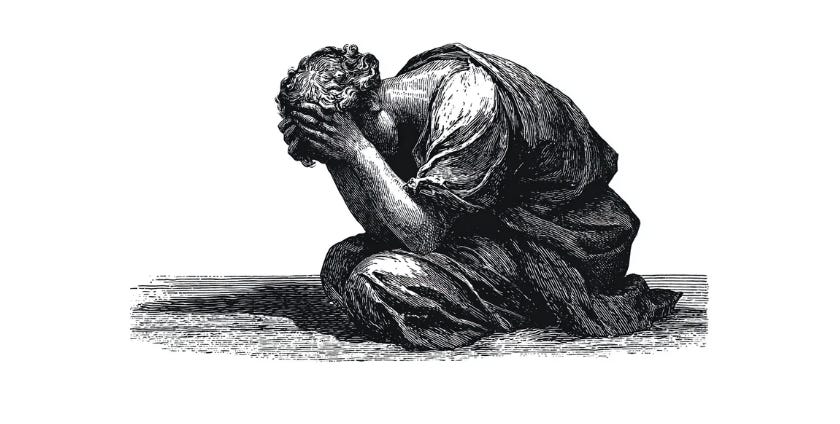When Your Body Won't Move
What holistic health looks like in freefall
I didn’t go to the gym yesterday.
I didn’t study for my trainer certification.
I didn’t leave my house—not even to walk Miles, my dog (don’t worry, he has a doggy door).
I didn’t do much of anything except cry and stare at the ceiling and wait for the hours to pass.
Something happened on Sunday night that knocked the ground out from under me. I’m not ready to get into the details yet—maybe ever, maybe someday, I don’t know.
But I need to write this because writing is cathartic and pretending everything is fine would be the opposite of what Tuesday Lab Notes is supposed to be.
And lastly, readers, if you’ve ever been here—where the routines that usually anchor you become completely impossible—maybe it helps to know you’re not the only one.
When your body says no
We talk a lot about holistic health in the fitness space.
Mind-body connection.
“Mental wellness” as part of fitness.
The “whole person,” not just the muscles.
But what far fewer talk about is when you are paralyzed by something that shocks your nervous system. When heartbreak—or grief, or whatever you want to call this feeling—literally keeps you in bed. Something that makes you say: “fuck wellness and everything I’m working towards.”
Yesterday, my Monday morning alarm went off at the usual time. I had my workout plan. I knew exactly what I was supposed to do. And I couldn’t make my body move. Not “didn’t feel like it.” Not “wasn’t motivated.” Couldn’t. Like my limbs were made of concrete.
I laid there thinking about all the things I tell people: movement helps with stress, exercise regulates your nervous system, routine provides stability when everything else feels chaotic.
All of it true.
None of it accessible.
The physics of grief
Here’s what I’m learning about acute grief, in real time: It’s not metaphorical. It’s physical.
Self-care isn’t face masks and bubble baths right now. It’s just surviving the next hour. Then the next one.
Your chest actually hurts. Like something is pressing on your sternum from the inside. You hyperventilate. Your stomach clenches and won’t let you eat even though you know you should. Your brain can’t hold onto thoughts for more than a few seconds before they slip away. You read the same sentence five times and still don’t know what it says.
Sleep becomes this weird thing where you’re exhausted but can’t actually rest. You drift off and wake up twenty minutes later with your heart racing, and for a split second you forget why you feel this way, and then you remember, and the weight comes crashing back.
People say “take care of yourself” and you know they mean well, but you can barely brush your teeth. Self-care isn’t face masks and bubble baths right now. It’s just surviving the next hour. Then the next one.
You’re not broken
This level of pain doesn’t mean you’re weak or foolish. It means you loved deeply, or cared deeply, or invested deeply in something that mattered.
That’s not something to be ashamed of.
I don’t have wisdom about this. I don’t have a lesson or a takeaway or a strategy that’s working.
I’m writing this from inside of it, less than 36 hours in, still trying to figure out how to breathe normally.
What I can tell you is this: if you’re someone who’s been here—where the thing that usually grounds you becomes impossible, where your body just won’t cooperate with what your mind knows it should do—you’re not broken.
This level of pain doesn’t mean you’re weak or foolish. It means you loved deeply, or cared deeply, or invested deeply in something that mattered. That’s not something to be ashamed of.
Your body shutting down isn’t a failure of discipline or mental toughness. It’s your nervous system doing exactly what it’s designed to do when it encounters something too big to process while still operating normally.
This is also health
I’ve spent years learning about the body—how it adapts to stress, how it needs recovery, how it responds to training. But this is a different kind of stress response.
This is your body protecting itself by shutting down. By saying “no, we’re not doing the normal things right now, we need all available resources just to process this.”
And here’s the thing I keep coming back to: this is also health.
Not healthy in the sense that I want to feel this way. But healthy in the sense that this is what a body does when it experiences trauma. It slows down. It prioritizes. It goes into a kind of conservation mode where everything non-essential gets turned off.
The gap between knowing “exercise would probably help me feel better” and actually being able to make your body do it—that’s not weakness. That’s not failure. That’s your system saying “not yet.”
Day by day
I don’t know when I’ll feel like lifting or rucking again. I don’t know when being happy will feel possible, or when food will sound appealing, or when I’ll stop feeling like there’s a sack of bricks piled on my abdomen.
But I know I’ll get there. Definitely not today. Probably not next week. But eventually.
For now, I’m just trying to get through. Day by day.
If you’re in a version of this too—wherever you are, whatever knocked you sideways—I’m right there with you. And I hope you’re being as compassionate with yourself as you’d be with someone you love who’s hurting this badly.
We’ll both get through this somehow.
Thanks for reading.
-Marek



Sending love and peace your way, Marek.